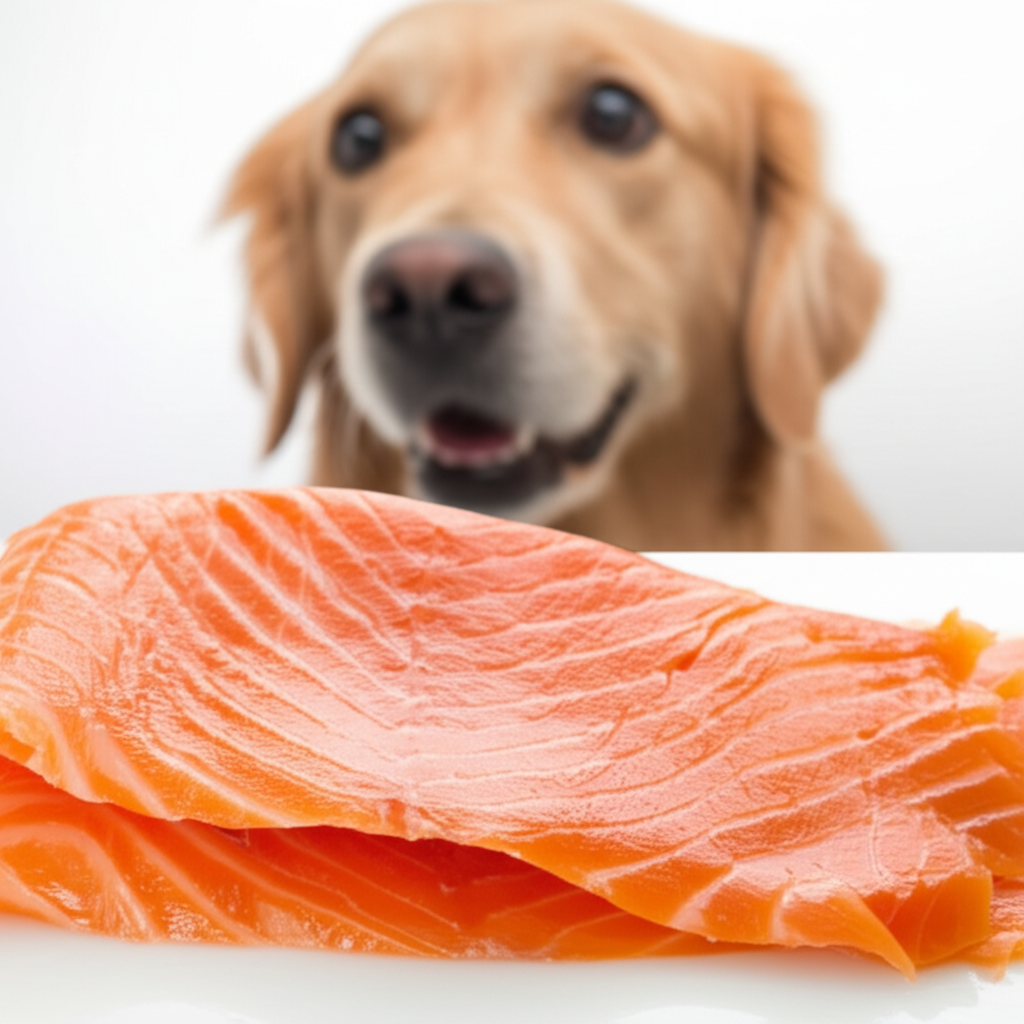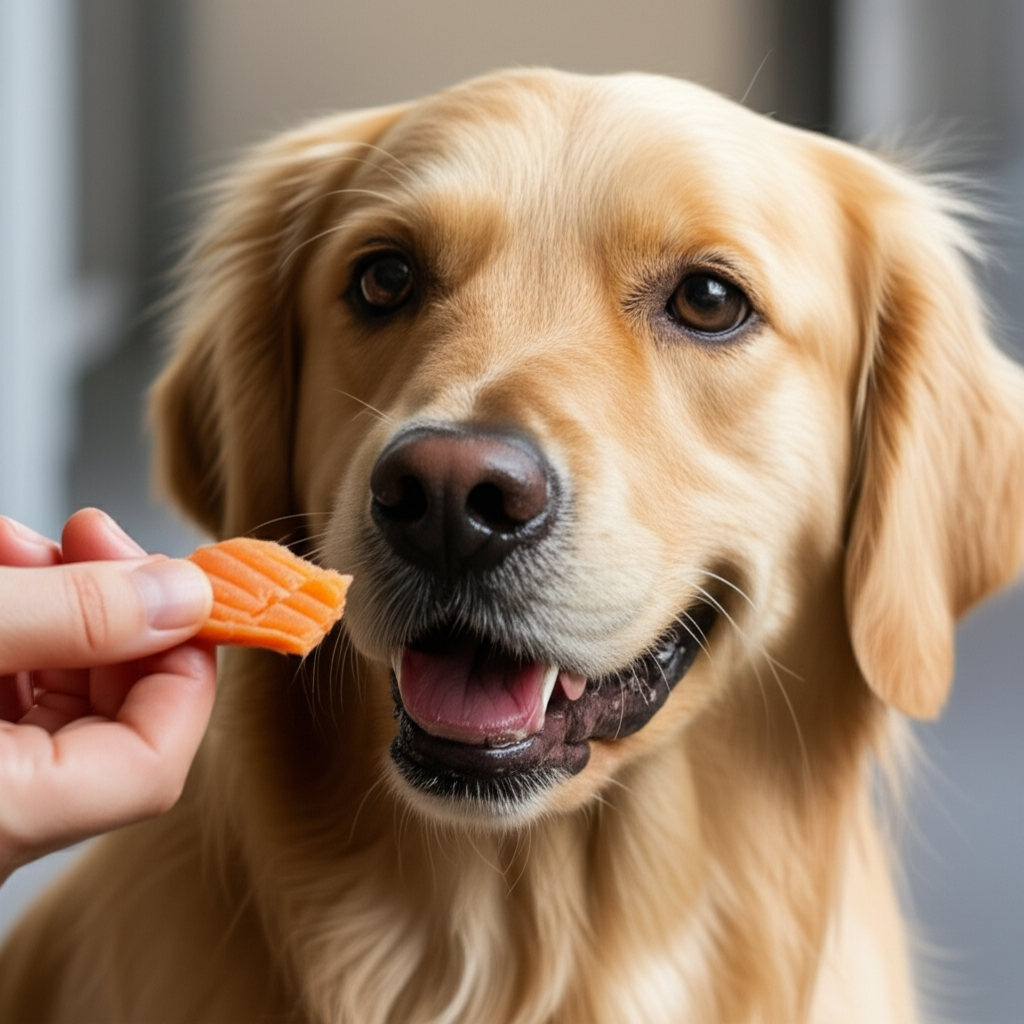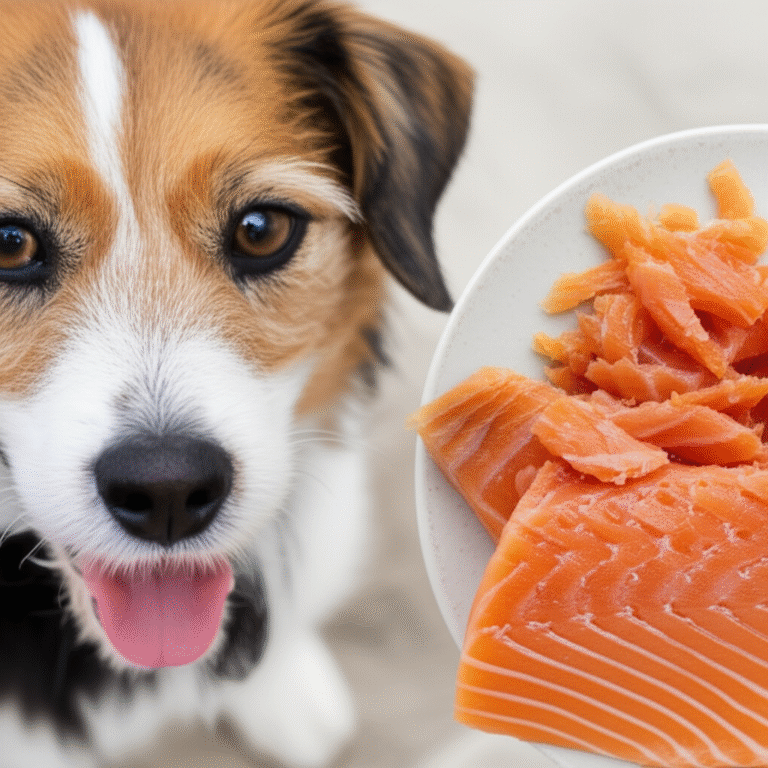- The Short Answer: Smoked Salmon and Your Pup? Better Skip It.
- Why Smoked Salmon is a Risky Treat for Your Dog
- What Happens If Your Dog Eats Smoked Salmon?
- Safe Salmon Alternatives for Your Pup
- The Bottom Line: Making Smart Choices About Dog Food
- FAQs About Smoked Salmon, Salmon, and Your Dog
You’ve just pulled out some beautiful smoked salmon. It smells incredible. Your dog, of course, is right there, sniffing the air, giving you those big, sad eyes. And you’re thinking, “Hey, this is good stuff. Full of Omega-3s. Maybe I can share a little bit with my best pal?”
The question “Can dogs eat smoked salmon?” pops into your head. It’s a fair question. We all want to give our dogs the best. We want to spoil them a little. But as good as smoked salmon is for us, a small piece for your dog might actually be a big problem. And nobody wants that. We’re here to give you the straight scoop, no sugar-coating, no fancy words. Just the facts you need to keep your dog healthy and happy.
The Short Answer: Smoked Salmon and Your Pup? Better Skip It.
Let’s cut right to it. Generally speaking, no, your dog should not eat smoked salmon. We know, it’s not the answer you might want to hear when you’re looking at that tasty fish. But there are some big reasons why this human delicacy isn’t a good fit for your canine buddy. Think of it like this: not all good food for us is good food for them. Simple as that.
Why Smoked Salmon is a Risky Treat for Your Dog
You might be wondering, “But it’s just fish, right?” Not exactly. Smoked salmon goes through a specific process that makes it delicious for human consumption, but also dangerous for dogs. We’re talking several key issues here.

1. Sodium Overload: Salt is the Enemy
This is the number one reason to avoid giving your dog smoked salmon. The smoking and curing process relies heavily on salt. A lot of salt. More salt than you might even realize is in there.
Dogs don’t handle sodium well. Their bodies aren’t built to process high amounts of salt like ours are.
Dehydration and worse: Too much salt can lead to serious dehydration, cause them to drink excessive amounts of water, and can even result in sodium ion poisoning. Symptoms of too much salt can include vomiting, diarrhea, lethargy, tremors, seizures, and in severe cases, even death.
Small piece, big impact: A small portion of smoked salmon for you is a huge amount of sodium for a dog, especially a smaller breed. Imagine a bag of chips. You can eat a handful. Your dog probably shouldn’t have even one chip. Smoked salmon is similar, but even more concentrated.
2. Hidden Seasonings and Spices

Smoked salmon often comes with more than just salt. Think about lox or other smoked fish varieties. They might have:
Garlic: Highly toxic to dogs. It can damage their red blood cells, leading to anemia.
Onions: Also toxic for dogs, causing similar blood issues as garlic.
Dill or other herbs: While some herbs are harmless, others can cause digestive upset or other issues.
Sugar: Unnecessary calories, bad for their teeth, and contributes to weight gain.
These ingredients are often used to enhance flavor for us, but they can be genuinely harmful to your dog. We definitely don’t want to risk that.
3. The Raw Fish Factor: Parasites and Bacteria
Even though it’s “smoked,” many smoked salmon products aren’t cooked at a high enough temperature to kill all potential parasites and bacteria. Smoking is often a curing process, not a thorough cooking process.
Salmon Poisoning Disease (SPD): This is a real thing. Raw or undercooked salmon (and other fish) can carry a parasite called Nanophyetus salmincola. This parasite can then carry a bacterium, which is what actually causes SPD. If untreated, it’s often fatal for dogs. Symptoms can appear within a week and include vomiting, diarrhea, fever, loss of appetite, and weakness. While less common in farm-raised fish, we don’t want to take any chances.
Other bacteria: Things like Listeria, Salmonella, and E. coli can also be present in improperly prepared fish, just like in any raw meat. These can cause severe gastrointestinal issues for your dog.
4. Bones: Tiny but Dangerous
Though many smoked salmon fillets are boneless, tiny bones can sometimes be missed. Even small bones can be a choking hazard or cause internal damage, potentially perforating their digestive tract. We want to avoid a late-night emergency vet visit at all costs.
What Happens If Your Dog Eats Smoked Salmon?
Okay, let’s say an “oopsie” happened, and your dog snagged a piece. Don’t panic, but do act.
Observe closely: For the next 24-48 hours, keep a very close eye on your dog.
Watch for symptoms:
Vomiting
Diarrhea
Excessive thirst or urination (signs of high sodium)
Lethargy or weakness
Loss of appetite
Tremors or seizures (severe sodium poisoning)
Fever (potential sign of SPD)
Contact your vet: If your dog ate more than a tiny piece, or if you notice any of these symptoms, call your veterinarian right away. Don’t wait. Tell them what happened, how much they might have eaten, and any symptoms you’re seeing. Time can be critical, especially with issues like sodium poisoning or SPD.
Safe Salmon Alternatives for Your Pup
So, if “Can dogs eat smoked salmon?” is a no, does that mean salmon is totally off the table? Not at all! Salmon, when prepared correctly, can actually be a fantastic, healthy addition to your dog’s diet. It’s packed with Omega-3 fatty acids, which are great for skin, coat, joint health, and even brain function.
Here’s how to do it right:
Plain, Cooked Salmon: This is the gold standard.
Preparation: Bake it, boil it, steam it. No oils, no butter, and absolutely no seasonings like garlic, onion, or dill. Just plain fish.
Bones and Skin: MAKE SURE to remove all bones and the skin. Salmon skin, though tasty for us, is very fatty and can contain contaminants.
Portion Control: Even plain cooked salmon should be a treat, not a meal replacement. A small, appropriate portion is key. Talk to your vet about what’s right for your dog’s size and activity level.
Salmon Oil Supplements: This is arguably the best way to give your dog the benefits of salmon without any of the risks.
Pet-specific: Use salmon oil specifically formulated for dogs. These are purified and dosed correctly.
Rich in Omega-3s: You get all the good stuff – the EPA and DHA – directly.
Easy to add: Just drizzle it over their regular food. Your vet can advise on the right dosage.
Other Healthy Fish Options (Plain & Cooked):
Sardines: Packed in water (not oil), no salt added. These are small, soft-boned (safe to eat), and full of Omega-3s. A great occasional treat.
Whitefish: Cooked cod, flounder, or tilapia. Again, plain, no seasonings, and all bones removed.
The Bottom Line: Making Smart Choices About Dog Food
Our dogs rely on us entirely for their well-being. That means making smart, informed decisions about what they eat. It’s not about being overly restrictive, it’s about being responsible.
We get it. It’s hard to say no to those puppy dog eyes. But remember, giving them something potentially harmful isn’t an act of love. Giving them safe, healthy alternatives is. Always double-check human foods before sharing, and when in doubt, just stick to their regular dog food, or a vet-approved treat.
Ultimately, we want our dogs to live long, healthy, vibrant lives. And sometimes, that means keeping those delicious human treats, like smoked salmon, just for us.
FAQs About Smoked Salmon, Salmon, and Your Dog
Q: Can dogs eat raw salmon?
A: No, absolutely not. Raw salmon carries the highest risk of parasites and bacteria, including the one that causes Salmon Poisoning Disease, which can be fatal. Always cook salmon thoroughly if you plan to share it with your dog.
Q: Can dogs eat cooked salmon skin?
A: It’s best to avoid it. While not inherently toxic, salmon skin is very fatty and can be difficult for some dogs to digest. It can also contain contaminants or be seasoned. It’s safer to remove the skin.
Q: What about salmon treats for dogs? Are those okay?
A: Yes! Treats specifically made for dogs that contain salmon are generally safe and can be a great way to give them the benefits of fish. These treats are formulated to be safe, with appropriate salt levels and no harmful ingredients. Always choose reputable brands.
Q: How much cooked salmon can I give my dog?
A: Cooked salmon should be an occasional treat, not a staple. A good rule of thumb is that treats should make up no more than 10% of your dog’s daily calorie intake. A small flake or two for a smaller dog, or a palm-sized piece for a larger dog, a few times a week, is usually fine. Always consult your vet for personalized advice, especially if your dog has any health conditions.
Q: Is salmon good for dogs at all?
A: Yes, very good! When prepared correctly (plain, cooked, boneless, skinless, unseasoned), salmon is an excellent source of Omega-3 fatty acids, which boost skin and coat health, reduce inflammation, support joint function, and even contribute to brain and eye development. The benefits are why we recommend approved salmon oil supplements or properly cooked salmon as a treat.
So, when that irresistible aroma of smoked salmon fills the air, remember it’s a treat truly meant for us. Can dogs eat smoked salmon? Our clear advice is to skip it and opt for safer, healthier alternatives for your beloved canine.

